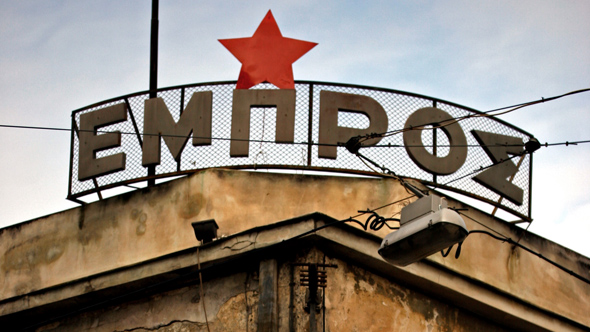
It was November 2011 when the lights were turned on again at the Embros Theatre, a historical building in the Psirri district of Athens that remained abandoned for 5 years as the Ministry of Culture let it fall into disrepair. In an attempt to bring it back to life, a group of theatre artists and theorists known as the “Mavili Collective” coordinated a 12-day series of talks, discussions and performances that were open to the public. Scholars and artists from various disciplines were invited together to challenge the dominant market-led consensus and embrace an alternative model of collective management, introducing new forms of creative work.
Psirri used to be a working class district dominated by small scale craft industries and families who didn’t move to the suburbs as the 1970s urban trend dictated. The area went through a process of gentrification that intensified in 2004 when Athens hosted the Olympic Games. Old industrial buildings were either converted into nightclubs or remained vacant. Restaurants and bars sprung up like mushrooms whilst small vintage shops became a “must-visit” destination for the hipster crowd. The influx of migrants and the grim effects of austerity made Psirri an area of contradictions where it was common to see young middle class people having drinks while migrants searched for food in trash bins just a few blocks away.
“Embros theatre has made its mark in Psirri as a diversity hub where art meets radical politics, a challenge posed by the economic crisis” says Eleni Tzirtzilaki, an architect and member of a local community group (“Psirri Residents Movement”) that joined forces with the Mavili Collective from the very beginning.
Thus, what started as a 12-day experiment, greeted with positive comments from the Press, had, within a year, evolved into a process that brought together more than 500 artists, academics and activists to show their work, stage performances and exchange ideas. The collective remained active in Embros for a year and, since November 2012, the theatre operates as an open cultural and social space that promotes self-management, equal participation, diverse voices and non-commercial values in the midst of an entertainment district of Athens.
An open assembly runs weekly and the daily practical demands such as cleaning, managing the website or running the small bar (which is the main funding source along with donations) are met by a group of approximately 10 people on a rotating basis.
“Embros is not used solely as a theatre, but appeals to a broader crowd. It’s open not only to artists who cannot financially support a stage play or wish to operate independently and beyond the demands of the commercial art world but also to people who are actively involved in grassroots social movements. It’s a politically plural space and that’s a positive thing, otherwise it would come across as having an affiliation with a political group,” says actress Tatiana Skanatovits.
Embros has invited Giorgio Agamben and Raoul Vaneigem as guest speakers and has established strong bonds with “Teatro Valle” in Rome, which is occupied by theatre workers. The space has also become a platform for migrants, feminists & the LGBT community. Art and politics are not considered as fixed and separate entities but dynamic and interrelated practices, an approach which makes it different from other autonomous social centres or squats.
However, the Greek authorities take a different view. Embros theatre has twice faced the risk of being shut down, sparking outrage and attracting more than 1,700 petition signatures in solidarity, from Greece and abroad. “The arrests of two actors while rehearsing in Embros brought even more people together against the planned eviction. The more open it is to the public the more difficult it becomes to shut down” says Eleni. “This diverse co-existence has not always been easy but what keeps us together is our strong desire to survive in times of political and cultural crisis.”
“It is my choice to operate in non-commercial spaces and one of the joys in Embros is the freedom to do things the way I want, just like anyone else involved here, of course,” adds Tatiana. “I explain to the people who come over – some of them without prior knowledge – what Embros really stands for. I get pleased to see them breaking free of stereotypes and grasp what an open space is really about. I encourage them to join. All of us, who have a longer and consistent presence in Embros, become happy when we see others reaching their dreams. Helping others sustains and attracts new people so we all make sure the space is used by everyone.”
By Joanna Panagiotopoulou | @Inflammatory_ | Photo: enterioni.blogspot.co.uk









